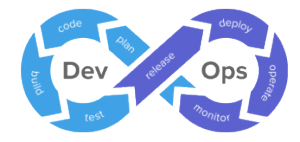A methodology for your digital transition: DevOps
You need to have your digital transition carried out as quickly as possible, and this requires creating and using functional, tailor-maded software with many possibilities for fast scalability.
In order to meet your needs, Tana Corp the DevOps Method as the way to guarantee full support through all the technological changes related to your business sector and the fast delivery of your software within the time limit. Such swiftness of execution is due to short development cycles involving the greatest attention to quality as the result of continuous testing.
The DevOps methodology, just like the SCRUM method that we also use, is an agile method, which provides a framework for fast and rigorous development, while remaining flexible and following common progression rules.
It is characterized by :
- Shorter development cycles, so that your software is delivered in the shortest possible time
- Early and continuous testing to ensure the quality and reliability of our products
- A short improvement loop, to ensure fast user feedback
- An increase in the frequency of deployments, so as to make your software evolve according to your feedback, your needs and those of your business industry
- in order to achieve the objectives we have set together to bring your project to life.

This iterative approach allows you to remain at the core of your project, as the speed of the cycles provide you with regular piloting and evolutions tailored to your needs
DevOps: principles and benefits
Définition
The term DevOps, attributed to Patrick Debois in 2009 during a lecture, comes from: developer (Build) and operations (Run)
It represents the two main functions of IS management, which, although complementary, have very different objectives:
- For software development (dev): the goal is productivity, i.e. answering the customer’s needs by designing and developing software within the given deadlines, sometimes at the expense of quality.
- For operations administration (ops): the goal is system stability, quality control, software reliability sometimes at the expense of cost and time constraints.
The DevOps culture and mindset consists in improving, or even recreating communication between these previously separate teams, so that they work together to improve practices and the quality of service offered to clients. Thus, the fields of competence grow wider and the roles hitherto assigned to each team are tending to redefine themselves.
The DevOps methodology is aimed at globalizing agile methods to the entire IS and applying the principles of agility to production.
Although there is no official definition for this term, we can quote the definition from the State of DevOps Report 2017 :
“Today, DevOps is an understandable set of practices and values that have proven, for companies of all sizes, their effectiveness in improving: software delivery cycles, software quality, security, and the ability to get customers back on the product quickly”.
Principles
- Automation of the various tasks (development, tests, etc.) for time optimization and quality improvement.
- Use of measurement tools and indicators to monitor processes and quickly find flaws or points for improvement
- Shorter development cycles and increased deployment frequencies
- Early and continuous testing
- Continuous deliveries
- A short improvement loop to improve user feedback
- Better communication and collaboration between departments
These practices are designed to improve productivity without compromising quality, and help improve the company’s performance in achieving its objectives.
Benefits
The DevOps method meets the need for companies to have the best possible production lead times, while having a clearer vision of the forecasts.
Improved quality is also a major point, as it makes the delivered software more reliable and secure, while making it possible to have rapid and numerous evolutions.
Furthermore, the swiftness of execution, the application monitoring and the improvement in quality all result in cost reduction for the company.
In conclusion, if you wish to go for it, DevOps is not only a methodology: it is above all a state of mind and a form of corporate culture to be acquired, which requires the involvement of everyone and the support of your organization before you can reap the benefits.





